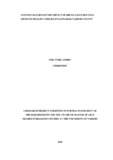| dc.description.abstract | This study focused on the impact of drugs and substance abuse on Muslim families in Eastleigh, Nairobi County-Kenya. The problem addressed by the study was that despite clear Islamic teachings against drug and substance abuse, this vice was rampant in Eastleigh and had an impact on the families thereby affecting their religiosity. It was established that studies done on the issue of drugs and substance abuse have not addressed the question of its effect on the familiy’s religious affiliation. This prompted the researcher to use the following specific objectives to address the problem: To analyse the teachings of Islam regarding the institution of the family, to investigate social- religious implications of Drugs and substance abuse on the Muslim families in Eastleigh, to evaluate the impact of drugs and substance abuse on the economy of the Muslim families in Eastleigh.
The study applied both the exploratory and descriptive research designs. There were a total of 109 respondents sourced through stratified sampling technique. The target population was Muslim families residing in Eastleigh who have a member involved in drug and substance abuse. The data was obtained through structured Interview guides and Questionnaires. Information was obtained through key informant interviews, Focussed group discussions and administration of questionnaires. The results were then analyzed thematically and inferences drawn. The study was guided by adaptation theory and addiction is a crime conceptual framework. The study established that despite the clear teachings on the prohibition of drug and substance use in Islam, the vice was very rampant in Eastleigh. The widespread use of drugs was as a result of availability of drugs and peer influence. From the findings, it was clear that commonly abused drugs in Eastleigh include khat, shisha, valium and cigarettes. These vice cut across all age groups and marital status. The study also found that drug and substance abuse had various negative effects on the Muslim families in Eastleigh that include high rates of divorce, laxity in religion, decrease in religious adherence, economic poverty, emotional and physical violence. Conclusion drawn from the study was that there is a direct correlation between drugs and substance abuse with Religiosity. The more an individual involved him or herself with drug abuse the less likely they were to adhere to religious doctrines and values. It is imperative therefore for the Islamic leadership to re-examine their delivery of the teachings on drugs and substance abuse so as to impact the members as well as their families. It was also established that drugs and substance abuse had an effect on the emotional, psychological, economical and spiritual well being of the Muslim families. The study was only carried in Eastleigh among the Muslims and therefore recommended that a similar or comparative study be done in other areas before making generalized conclusions on the subject. | en_US |



